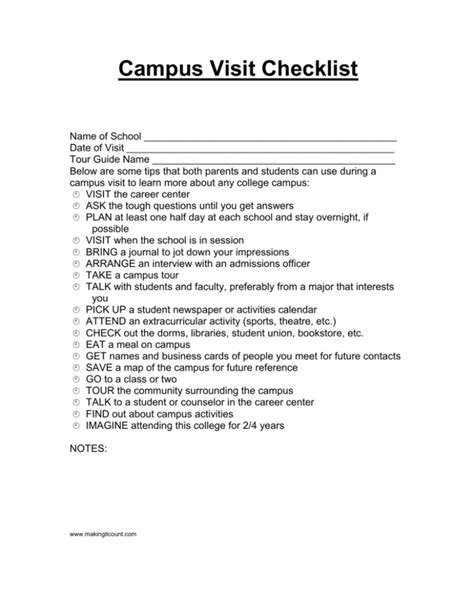College visits are an invaluable opportunity to gain firsthand experience of potential campuses, meet students and faculty, and explore academic programs. To make the most of your visit, it is essential to come prepared with everything you need to gather necessary information and make an informed decision. Here’s an exhaustive checklist of items to bring on your college visit:

1. Essential Documents
- ID card or passport
- College application materials (if applicable)
- Transcripts and test scores (if not already submitted)
- Letter of recommendation (if requested)
- Payment method for any expenses (e.g., application fee)
2. Note-Taking Materials
- Notebook or tablet
- Pens or pencils
- Highlighters or sticky notes
- Camera or phone for taking pictures
3. Campus Safety and Information
- Campus map
- Contact information for campus security
- Emergency procedures guide
- Visitor parking pass (if required)
4. Personal Essentials
- Comfortable shoes (you’ll be doing a lot of walking)
- Water bottle or reusable cup
- Snacks (especially if your visit will be extended)
- Umbrella or raincoat (in case of unpredictable weather)
- Sunglasses (for sunny days)
- Phone and charger
- Hand sanitizer
- Tissues
5. Research and Planning
- List of questions to ask students, faculty, and admissions staff
- Research on specific academic programs and extracurricular activities that interest you
- Schedule an appointment with an admissions counselor or faculty member (if possible)
- Check the campus website for events and tours during your visit
6. Conversation Starters
- Ask questions about the campus culture, student life, and academic resources
- Engage with current students and faculty members to learn about their experiences
- Ask about clubs, organizations, and research opportunities that align with your interests
7. Other Considerations
- Bring a bag to carry all your belongings
- Dress comfortably and professionally
- Be respectful of the campus environment and other visitors
- Allow ample time for your visit to avoid feeling rushed
- Consider sending a thank-you note to your hosts after the visit
Benefits of Being Prepared
Coming prepared to a college visit not only ensures a smooth and productive experience but also conveys your genuine interest and commitment to the institution. By being organized and proactive, you can:
- Gather comprehensive information about the campus, programs, and student life
- Impress admissions officers and faculty members with your preparedness
- Make informed decisions about your future academic path
- Avoid feeling overwhelmed or unprepared during the visit
- Improve your chances of acceptance and scholarships
Effective Strategies for a Successful Visit
- Plan your visit in advance and schedule appointments to meet with key individuals
- Dress professionally to show your respect for the institution and its representatives
- Actively engage in conversations and ask insightful questions
- Take notes to record important information and impressions
- Follow up with a thank-you note to express your appreciation for the visit
Pain Points and Motivations
- Lack of preparation can lead to missed opportunities, forgotten questions, and a less-than-optimal experience
- Students may feel overwhelmed or anxious if they are not adequately prepared
- A well-planned visit can alleviate stress, build confidence, and enhance the overall outcome
Conclusion
Preparing for a college visit makes a world of difference in the quality of your experience. By bringing the necessary items and resources, you can maximize your time on campus, gather valuable information, and make informed choices. Remember to approach your visit with enthusiasm, ask questions, and soak up the atmosphere. With proper preparation, you will gain a deeper understanding of potential campuses and take a significant step towards finding the right fit for your future.
